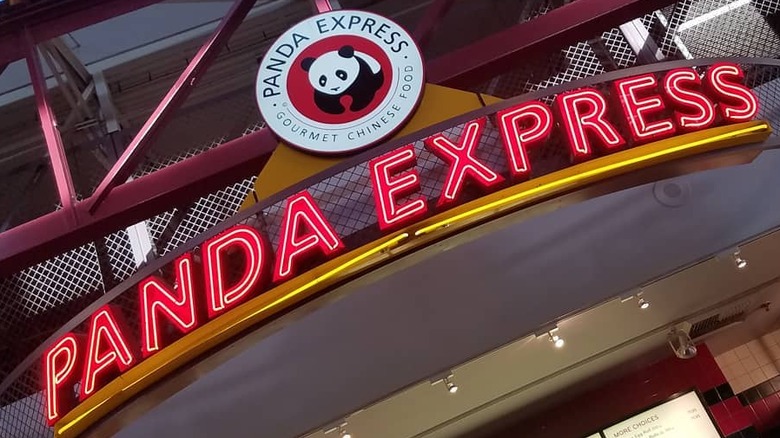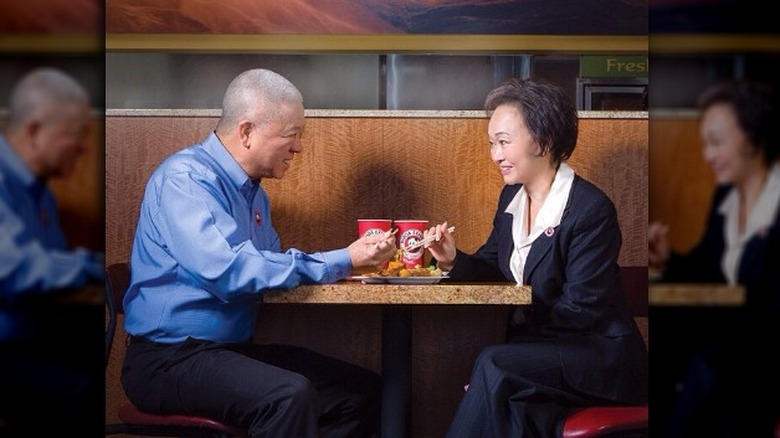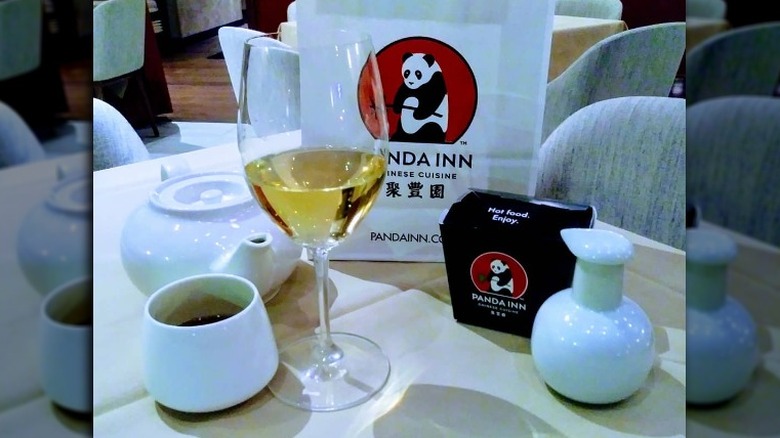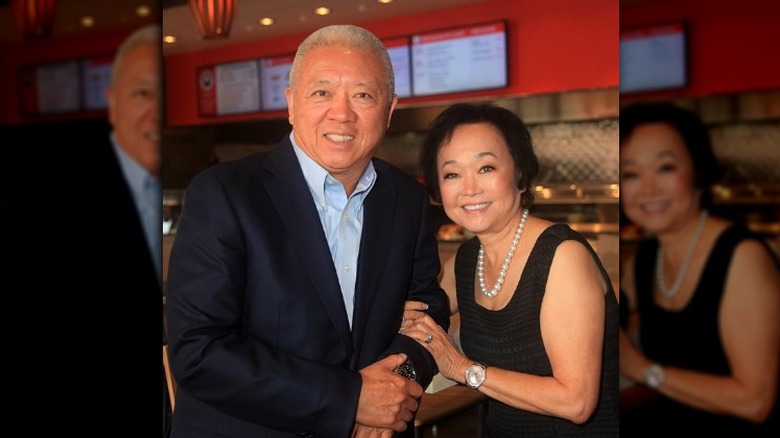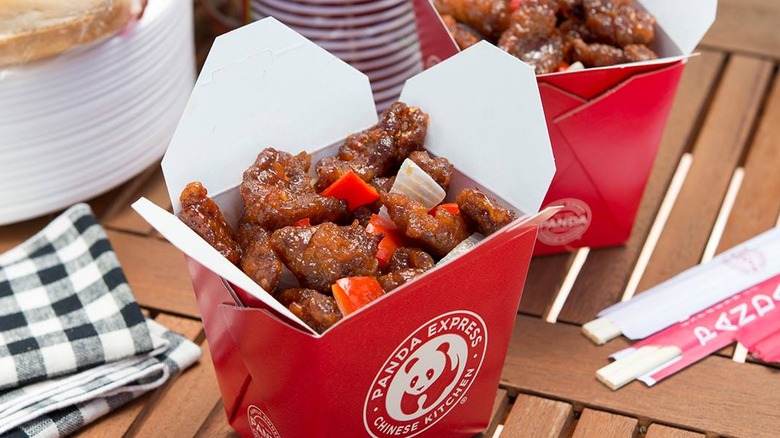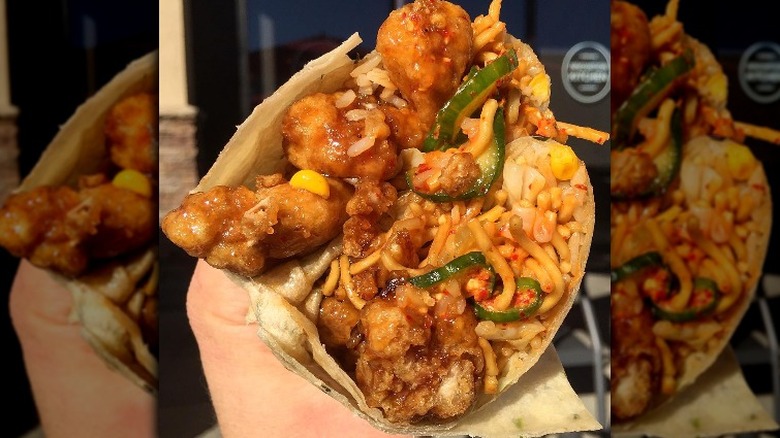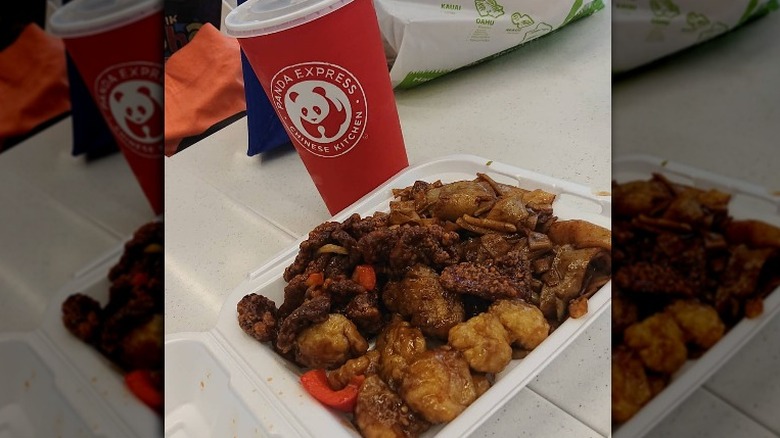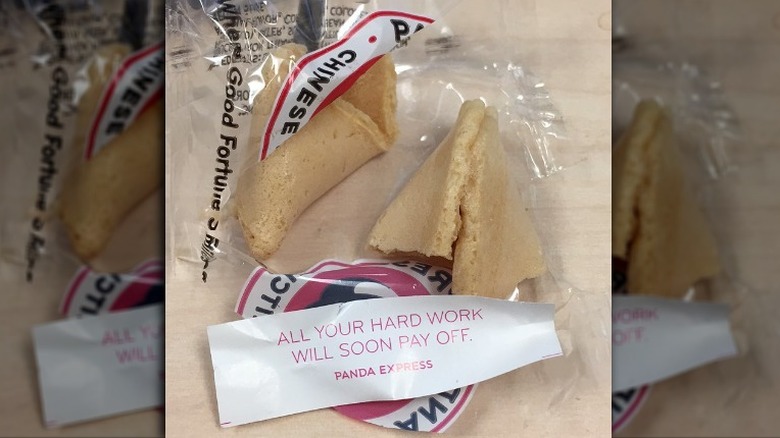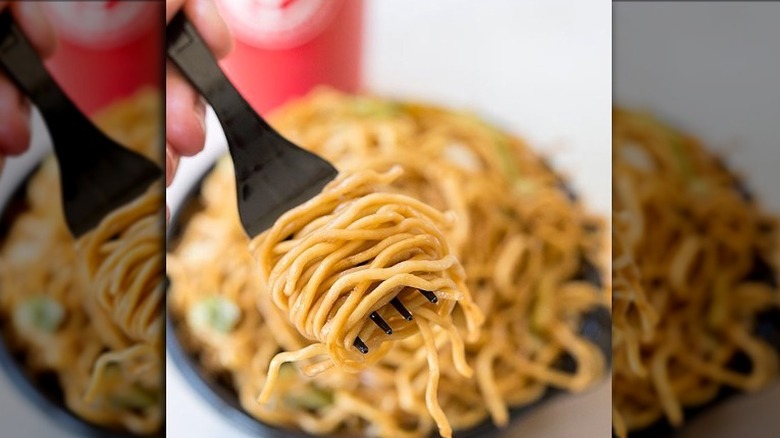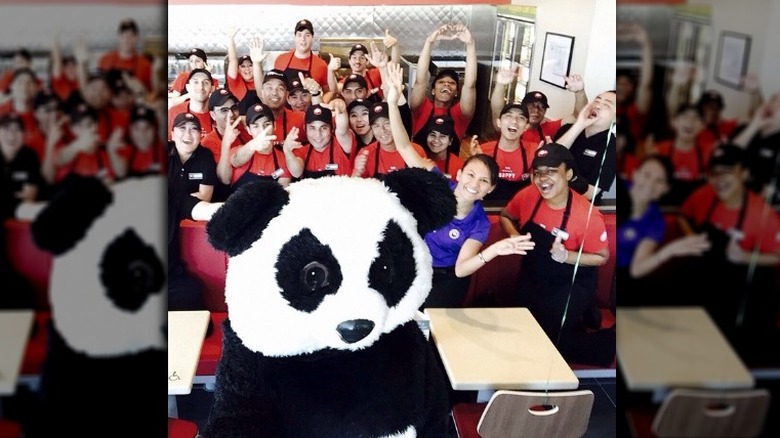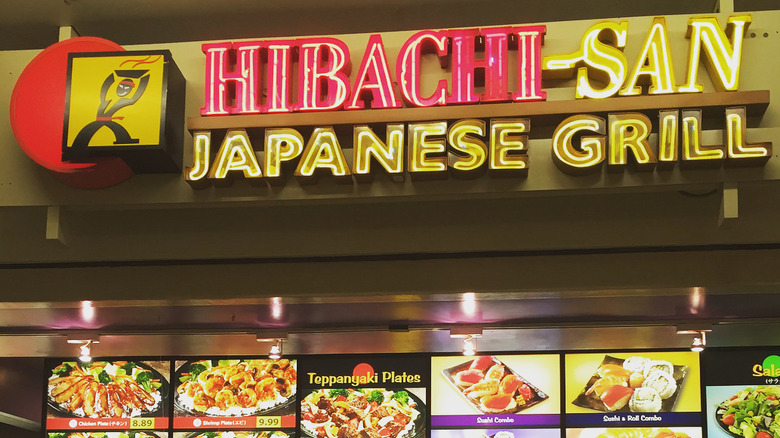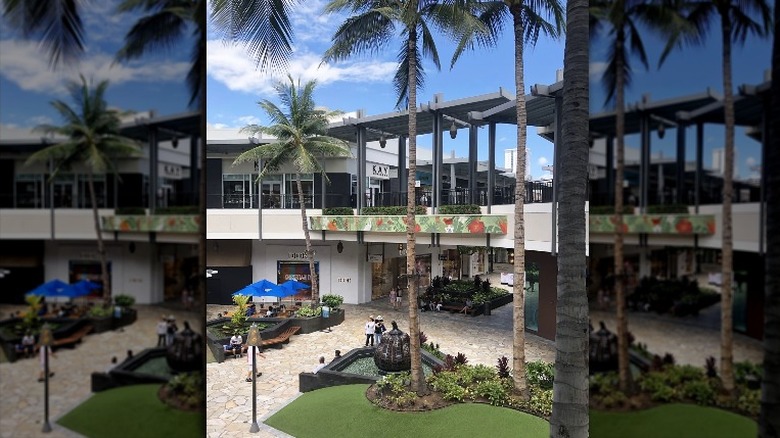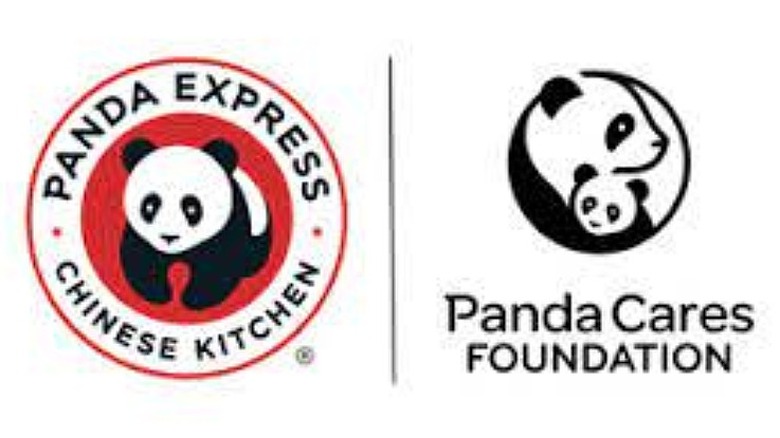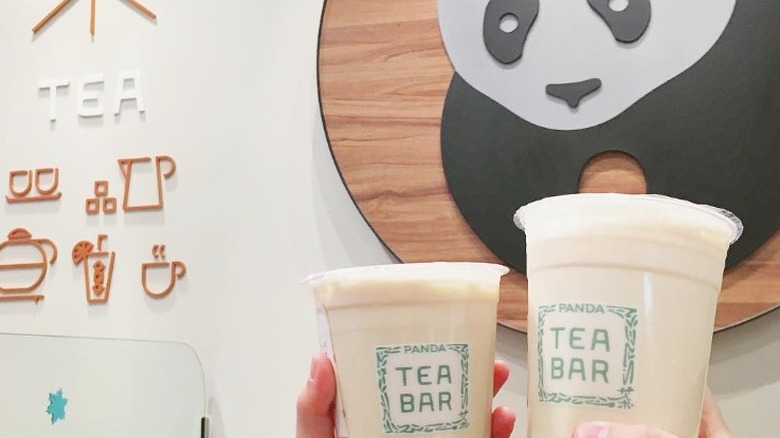The Untold Truth Of Panda Express
There is an old Chinese adage that says, "Food is the first necessity of the people." Anyone who's exhausted after a long day of dragging bags through a shopping mall or running through an airport to catch a flight knows this to be true, and when they pass by a Panda Express, they'll happily stop in for some spring rolls or broccoli beef. With its diverse cooking styles, flavors, and ingredients, Chinese food is one of the most popular cuisines in America. Just how popular is it? According to a survey done by Eater, Chinese food is the second most popular food delivery item in the United States. There are more Chinese restaurants in America than all the McDonald's, Pizza Huts, Wendy's, Taco Bells, and KFCs combined. One of the most popular, and one that helped bring Chinese food to the masses, is Panda Express.
Aside from knowing just how delicious the chain's orange chicken is though, you probably haven't given this Chinese fast food restaurant much thought as you scarfed down your plate full of chow mein at the food court. From its humble beginnings to the jaw-dropping number of fortune cookies they give out each year, this is the untold truth of Panda Express.
Panda Express is a family business
Once upon a time in Kansas, two Baker University students met and they fell madly in love, and born of this love was some of the yummiest Chinese food food you will ever eat, and we all lived happily ever after stuffing our faces with broccoli beef and orange chicken.
Panda Express co-CEOs Andrew and Peggy Cherng both came to America as Chinese immigrants in the mid-1960s. They moved to Los Angeles shortly after graduation so that Andrew could help his cousin restaurant with his restaurant, but disagreements over the business eventually led to Andrew going out on his own. In 1973, along with his father, Andrew opened and ran Panda Inn in Pasadena, where the entire family worked. Fast forward more than four decades, and the Cherng family has more than 2,000 Panda Express restaurants in the United States (as of 2018). There are also locations in Canada, Mexico, Japan, South Korea, Saudi Arabia, UAE, Guatemala, and Aruba. And just because Panda Express is a mega-success doesn't mean the Cherngs have forgotten their roots. Their daughter Andrea is the company's chief marketing officer, and they own and operate every restaurant — they don't franchise them out to others, save for a few select locations. At Panda Express, it truly is a family business.
The first restaurants were fancy
Andrew Cherng and his dad, master chef Ming-Tsai Cherng opened the first Panda Inn in Pasadena, California in 1973. The elder Cherng had previously been a chef in Shanghai, Taipei, Taiwan, and Yokohama, Japan. Far from the red and white panda-emblazoned fast food restaurants you know today, the Panda Inn was started in a dilapidated coffee house with a trailer in the back where chef Ming-Tsai would prepare the food. Eventually, though, that shuttered coffeeshop transformed into an upscale sit-down restaurant that became popular quickly.
Andrew told the Los Angeles Times, "We had a back door to the restaurant and I would go into the parking lot and say, 'Thank you for coming. I'm sorry we're crowded, but if you'll wait, I'll buy you a drink.' And they might return to the restaurant, saying, 'Wow, all this for our business?'"
It's that level of customer service and the popularity of the restaurant that made the Glendale Galleria ask the Cherngs to open a fast food location at their mall, thus Panda Express was born. There are still five Panda Inn locations, and best of all? Your meal concludes with chocolate-dipped fortune cookies.
Panda Express was a pioneer in bringing technology to restaurants
Panda Express co-founder Peggy Cherng has a B.S. in applied mathematics, an M.S. in computer science, and a Ph.D. in electrical engineering, so when the restaurants first opened she was instrumental in implementing portable computers to process orders in every location. Of course, most restaurants you frequent today have computerized systems for taking orders and managing data, but Panda Express was one of the first restaurants to do so, all thanks to Cherng. According to Business Insider, "Peggy Cherng used her engineering expertise to streamline the company's operations and logistics. She pioneered the use of technology for tasks like tracking inventory and re-ordering ingredients, a practice other American Chinese restaurants had not yet adopted."
Foodbeast quotes Cherng as saying, "The kitchen area is low tech, but the management system can be high tech — how to catch the data, how to analyze data to see what's most salable, what's not selling, and to determine what to offer and what not to offer." Today Peggy Cherng is one of the richest, self-made, foreign born women in America.
Panda Express actually is authentic
One of the criticisms you'll see lobbied against Panda Express is the question of its authenticity. Is it Chinese food? Is it American food? Technically, it's both. It was founded by Chinese immigrants who adapted Chinese food for the American palate, and for a lot of Americans, it's been their first introduction to Chinese cuisine. Chief marketing officer Andrea Cherng told Goldthread, "In the beginning, everything was already being translated by master chef Ming-Tsai Cherng. And the way that he cooked always had that Chinese heritage."
Culinary director Jimmy Wang told Restaurant Drive, "American Chinese cuisine is very authentic to Panda Express. Our ever-evolving style of food was born from adapting traditional Chinese recipes, flavors and cooking techniques to American ingredients and tastes. As American palates evolve, we will continue to take inspiration from the local flavor profiles of both Chinese provinces and American regions."
You rarely see people ask if Pizza Hut is authentic Italian food, or if Chipotle is authentic Mexican food, because it's pretty common knowledge that both of these fast casual restaurants are "Mexican-inspired" or "Italian-inspired." Andrea Cherng told Business Insider that Panda Express is "a story of immigrant Chinese chefs and families coming to the US, for what they hope will be a better life. It's a story of taking the recipes and the repertoire of their own culinary skill set and making it appeal to an [American] national palate." They did, and came up with authentic American Chinese.
The Panda Express Innovation Kitchen sounds amazing
There's only one Panda Express Innovation Kitchen located in Pasadena, California, but once you hear about the menu offerings you'll wish you had one in your city. There's a honey walnut shrimp wrap with green papaya slaw, crispy wontons, and fresh salad greens, along with other salads and wraps. Most appealing, though, is that you can customize your entire meal exactly the way you want it.
Eater explains the Innovation Kitchen concept, saying, " the new menu requires guests to select a base (chow mein noodles, a scallion pancake that turns the dish into a wrap), protein (honey walnut shrimp, chicken breast), sauce, and toppings, then stir-fries the dish to order. A separate counter, near a section of plush chairs and conversation nooks, houses a 'tea mixology' bar that serves 'artisanal tea infusions,' boba teas, and pastries."
If you're not lucky enough to live near Pasadena, Dave Wallinga, vice president of guest marketing at Panda Restaurant Group, told the San Gabriel Valley Tribune that there's still hope: "At the Innovation Kitchen, guest feedback is encouraged so Panda can refine its products. Then, after making sure it can reproduce them consistently, it will offer the best dishes at all Panda Express sites." We need the orange chicken wrap to come to our local Panda Express in the very near future because it sounds delicious.
Panda Express sells a ton of orange chicken
Any Panda Express fanatic knows how good the chain's orange chicken is, and it should be — it's been on the menu since 1987. When it was first introduced by former executive chef Andy Kao, though, it was served bone-in, rather than the classic boneless dish you find at any Panda Express today. And you will find a lot of it, because the chain sells nearly 70 million pounds each year. It's so popular that more than 50 percent of Panda Express diners select orange chicken as part of their meal.
Panda Express orange chicken is everything delicious in one tasty meal — boneless fried chicken tossed in a sauce that's just a little bit spicy due to the dried chilis, but sweet thanks to orange peel, honey, and ginger. So as not to leave the vegetarians out, the chain even makes a vegetarian orange chicken with paneer for its Mumbai, India location. The orange chicken recipe has remained pretty consistent over the years, except a tweak that was made by adding bacon that left many fans pretty upset. They also offered orange chicken and waffles on their food truck to celebrate the famous dish. That sounds like a dish out of an orange chicken dream.
Panda Express gives out a lot of fortune cookies every year
Panda Express hands out 282 million fortune cookies every year, but they aren't always just your standard fortune cookies. For a 2016 campaign, the restaurant renamed the classic treat Fortunate Cookies and included FortuNotes inside, white slips that expressed gratitude and kindness, rather than the typical proverb or prophecy. Andrea Cherng told Fox News, "The goal is that [customers] will pause and stop and acknowledge the people in their lives that they feel most fortunate for." Of the new packaging and signage, she explained, "We wanted guests to know that this is something different and that it's meant to convey the journey of acknowledgement for the people that matter in our lives." Cherng concluded, "The habit of pausing and saying to someone that you matter — that's the richness, that's the fortune of life."
Some of the fortunes read, "You will help someone in need this week," "Your kind attitude will keep others afloat," and "You are exactly where you're supposed to be." Those sweet messages probably made those cookies taste all the sweeter to guests at the restaurant.
Pressure from PETA prompted a Panda Express menu change
For the first time in the chain's history, Panda Express added plant-based items to its menu in 2019. The items included spring rolls, eggplant tofu, chow mein, and Super Greens mixed veggies (which contains cabbage, broccoli, and kale). Until this menu change, Panda Express flavored its dishes with chicken broth and other animal product seasonings.
According to PETA (People for the Ethical Treatment of Animals), this change was thanks to their supporters. "When Panda Express told PETA that its vegetable-based dishes were still prepared with meat-based flavoring, we urged the company to get with the times and offer vegan options in its 2,000 stores across the globe. When it continued to give us excuses, we sent out an alert, and our supporters wrote the company over 234,000 times demanding change," PETA explains.
But one issue that strict vegans may have with these new dishes is that although they don't contain meat or animal by-products, Panda Express notes that they are still prepared in the same kitchen as the meat items, using the same space and cooking equipment. Some vegetarians discussing the cross-contamination issue on Reddit have a problem with the idea of their food being cooked in the same pans that have prepared meat, while others don't. Nonetheless, the company has been transparent about this so that diners can make up their own mind based on their dietary preferences and any allergies they may have.
Panda Express is very into their employees
Founder of Panda Express Andrew Cherng told Los Angeles Magazine that his job is to develop people. "When you have a good set of people, and they're in a good place inside and out — in their livelihood and in who they are — then chances are they will take care of the customer better," he said.
Employees at Panda Express receive health care, paid time off, 401(k)s, and company-subsidized continuing education. They also receive discounts to theme parks and gym memberships, among other perks. The Cherngs even purchased a Robert Indiana Love sculpture that sits outside their corporate headquarters. Peggy Cherng told The New York Times "We are building a culture on trust, and the aim of trust is love. Love is the verb we emphasize with our Panda family. We must respect and care for each other. We must push and stretch each other." It's that type of corporate statement that makes it seem like being part of the Panda family makes it a very nice place to work.
Panda Express beat out the competition by becoming the competition
If a restaurant is worried about competition in the food court at a shopping mall, they could always do what the Cherngs did: start their own competing restaurant. According to Fortune, Andrew Cherng said, "We started Hibachi-San in malls in 1992 as a defensive strategy to keep Japanese restaurants from selling against our Chinese food at Panda Express."
Hibachi-San is a Japanese fast casual restaurant which offers items like tepanyaki plates and sushi. Considering that, according to Eater, "there's an increasingly prominent Japanese culinary presence across America," it makes sense that you'd be able to buy your poke bowls next to a Chik-fil-A or a Cinnabon. The Cherngs knew that starting their own Japanese chain would mean that whether a customer was deciding between Panda Express or Hibachi-San, they'd always win. Hibachi-San has 18 locations across the United States (as of June 2019).
You can find a Panda Express almost anywhere
The most profitable Panda Express is located at the Ala Moana Center food court in Honolulu, Hawaii and it brings in about $4 million a year, more than any other Panda Express restaurant. That's a whole lot of orange chicken! And it's not just shopping malls where you can find Panda Express — they are also located as stand-alone restaurants, in airports, at universities, theme parks, casinos, and military bases. With new restaurants opening worldwide, it's safe to say that the Cherngs have come a long way since Andrew Cherng opened his first restaurant. Los Angeles Magazine says that Andrew once told his mother that "he planned to someday open 99 more restaurants." His mother said she remembered being flabbergasted. "You only eat three meals a day. What do you need 100 restaurants for?" she said, before continuing, "He was a good child who usually did listen, but in that instance he didn't." Thank goodness he followed his dreams so all of us can enjoy orange chicken and broccoli beef all over the world.
The Killers tried to get free orange chicken for life
Think you have an obsession with Panda Express orange chicken? One band tried to get a lifetime supply of it out of the chain.
The Killers' 2004 album titled Hot Fuss has a song on it called "Smile Like You Mean It," which the band happened to find written on a slip in one of their fortune cookies after chowing down on a meal from Panda Express in 2017. How did the band react to this? By jokingly putting Panda Express on blast by tweeting, "I'm thinkin' orange chicken for life and we'll let you off the hook for using our stuff." The band's claim to inventing the phrase seems a bit iffy considering any third grader posing for school picture day probably heard the same words uttered by the photographer, but you can't fault The Killers for wanting to be swimming in that yummy, sticky orange chicken. This beef (er, chicken?) all worked out in the end because Panda Express ended up making a financial donation to the charity of the band's choice.
Panda Express will soon be heading to the Metaverse
It's hard to imagine living in the metaverse, let alone operating a restaurant in the metaverse. After all, the latter can be a tad more complex than traversing a world inside of a Sims game.
Many fast food restaurants are jumping on the virtual metaverse train, such as Chick-fil-A with their version of "Moo-taverse" and Wendy's with their possible "Wendyverse" (via Nation's Restaurant News). Even Chipotle launched a Burrito Builder within Roblox, where fans could earn Burrito Bucks in order to purchase real-life burritos (via PR Newswire).
Following suit, Panda Express is one of the latest restaurants gearing up to joining the metaverse, according to Twitter. The uniquely named, highly original "Pandaverse" would be a digital restaurant offering virtual goods and items in the metaverse that could be transferred to non-virtual in-store purchases. Like most restaurants moving towards the metaverse, Panda Express will probably use its existing loyalty program to transfer virtual perks into the real world (via The Takeout). As of 2022, there is no timeline for when Pandaverse will become a (virtual) reality, but as early as now, we are definitely ready to enjoy orange chicken and lo mein in the metaverse.
Panda Express has its own charity organization
We love a fast food chain that not only provides us with semi-delicious and quick dinners, but also tries to make a positive impact in the world. Some fast food chains have charities that make a difference in people's lives (like McDonald's Ronald McDonald House Charities), and Panda Express is no exception. Its charity, Panda Cares, was founded in 1999 in order to serve various communities through funding, food drives, volunteerism, and disaster relief efforts. In fact, Panda Cares has given millions of dollars to aid various relief efforts, including those for victims of the Indian Ocean tsunami, Hurricane Katrina, the Myanmar cyclone, the Haiti earthquake, and Hurricane Sandy.
In 2020, the Panda Cares Scholarship Program was founded to help students build a brighter future, in partnership with UNCF. It also partnered with the Boy & Girls Club of America in 2020 to raise more than $13 million dollars in funding, and became the BGCA's largest single-year corporate partner in 2021.
Panda Express doesn't put MSG in its food
MSG or monosodium glutamate has gotten a bad rap over the years as an unhealthy preservative commonly associated with takeout food. Often the root of Chinese Restaurant Syndrome, The Guardian explains that the old wives' tale around MSG being bad for you is more myth than fact. Chef David Chang told Wired that despite being banned in some cities, the consumer fear is based primarily on misinformation about certain processed foods.
That said, there is some research that shows a weight increase in some Chinese adults when the amount of MSG in their diet increased (via the National Library of Medicine). However, the Mayo Clinic explains that there is no definitive research to link MSG to symptoms such as headache, chest pain, or heart palpitations.
Still, it may surprise you that Panda Express doesn't include MSG in their food. On the Panda Express menu, all items state that there is no MSG present in them, excluding naturally occurring MSG found in some ingredients. One Reddit thread hypothesized that Panda Express uses ingredients like disodium inosinate and disodium guanylate to create a similar effect to MSG, even though there is no information confirming it on the company website.
You might find a tea bar at some Panda Express locations
It's difficult not to love bubble tea, and it's equally challenging not to love Panda Express. Perhaps unsurprisingly, combining the two results in a match made in fast food heaven — arguably even better than most fast food fusions.
In 2018, Panda Express unveiled Panda + Tea bars in select Panda Express locations, starting in California (via PR Newsire). Panda Express tea bars are in restaurants around Arizona, California, Florida, Washington, Maryland, and other states across the country.
The menu draws inspiration from traditional milk teas and adds its own twist to them. Drinks like the Sparkling Strawberry Sorbet and Sparkling Mango Sorbet are inspired by a traditional yogurt soda called yǎnglèduō, and its Crème Brûlée Milk Tea is a delightful twist on a Taiwanese milk tea (per KPCC). Panda Express's menu also includes a variety of fruit teas, lemonades, milk teas, smoothies, and of course, different types of boba and fruit jellies. Consider this the official petition for Panda Express to open up a tea bar in every state –– Kung Fu Tea had better get ready for competition.
